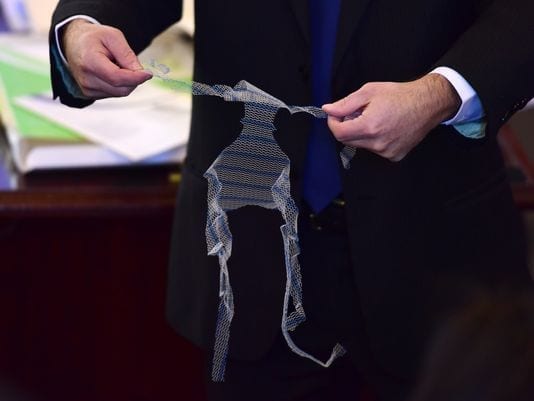Earlier this month, a New Jersey jury found in favor of a woman who had been injured by pelvic mesh. The jury awarded Elizabeth Hrymoc, 71, $15M in her suit against Johnson & Johnson’s (J&J) subsidiary Ethicon, the mesh manufacturer. The $15M verdict consisted of $4M for pain and suffering, $1M for loss of consortium (conjugal affection with her spouse), and $10M in punitive damages, meant to send the defendants a clear message that their behavior is unacceptable.
Earlier this month, a New Jersey jury found in favor of a woman who had been injured by pelvic mesh. The jury awarded Elizabeth Hrymoc, 71, $15M in her suit against Johnson & Johnson’s (J&J) subsidiary Ethicon, the mesh manufacturer. The $15M verdict consisted of $4M for pain and suffering, $1M for loss of consortium (conjugal affection with her spouse), and $10M in punitive damages, meant to send the defendants a clear message that their behavior is unacceptable.
Mrs. Hrymoc was treated with Prolift, Ethicon’s polypropylene pelvic mesh. This type of implant is a common treatment for organ prolapse, typically caused when the vaginal walls begin to weaken with age. She was implanted in 2008 and soon after found herself dealing with chronic pain, painful intercourse, and urinary incontinence (ironically, another of the conditions the device was designed to treat). Mrs. Hrymoc was implanted with two Prolift mesh devices in 2008, and her case centered on the one that caused her injuries.
Pelvic mesh devices in general are also called slings and Prolift got the FDA’s stamp of approval in 2002. However, due to the number of complaints about the various brands, the FDA has told healthcare providers that pelvic mesh is now a “high-risk” treatment. Mrs. Hrymoc’s is one of thousands of lawsuits over such devices. According to her lawyer, Adam Slater of Mazie Slater Katz & Freeman, he has 240 active pelvic mesh cases himself.
As a note, J&J/Ethicon pulled the Prolift device from the market in 2012, citing financial reasons.
Mrs. Hrymoc’s claim was not just that the Prolift device was defective, but that she was also never warned of the risks involved with the device.

Shortly after the verdict was handed down, Mrs. Hrymoc said she was pleased with the outcome “but not just for myself. For the thousands of other women who have gone through this. I’m very pleased that justice was done, not just for me, but for all other women who were hurt.”
The jury, for its part, unanimously agreed with Mrs. Hrymoc. The testimony presented by expert witnesses and doctors was very technical and took 2.5 weeks to get through. With over 1M documents involved in her case, the four women/six men jury needed just six hours to reach two unanimous verdicts: the Prolift device was defective, and the risks were not adequately explained to Mrs. Hrymoc.
Many of the documents presented as evidence were internal from Ethicon and included memos and reports written by Ethicon’s researchers. Some of these documents openly expressed the researchers’ doubts that Prolift was actually safe. One such instance was the concern that the polypropylene mesh may contract once implanted. The researchers were concerned that it could erode the vaginal wall. It may not have been part of the internal documents, but in other cases, a contracted mesh device could also cause discomfort and painful intercourse.
Even facing those issues, Ethicon moved ahead with the Prolift device and it was introduced to the market without a clinical study. This often happens with medical devices that are substantially similar to devices that have already been studied and given FDA approval.
Despite pulling the product from the market in 2012, Ethicon still argued that it was safe. The company said its 50-person research team spent thousands of hours in product development and testing.
Mrs. Hrymoc’s lawyer, Mr. Slater, said that the team, and company executives, ignored many “red lights” during the process. He continued, saying that, while the case was quite complex, the evidence presented was clear.
He added, “We felt the case was very strong, and we felt the wrongdoing was clear.” He called Mrs. Hrymoc and her husband “incredibly brave” for tacking such a major player in the medical device field.
Of course, Ethicon immediately released a statement of its intent to appeal.
According to company spokesperson Mindy Tinsley, “Ethicon intends to appeal this verdict, as we believe that the evidence showed that the company appropriately informed surgeons of pertinent complications and that the products were properly designed and studied.”


Join the conversation!